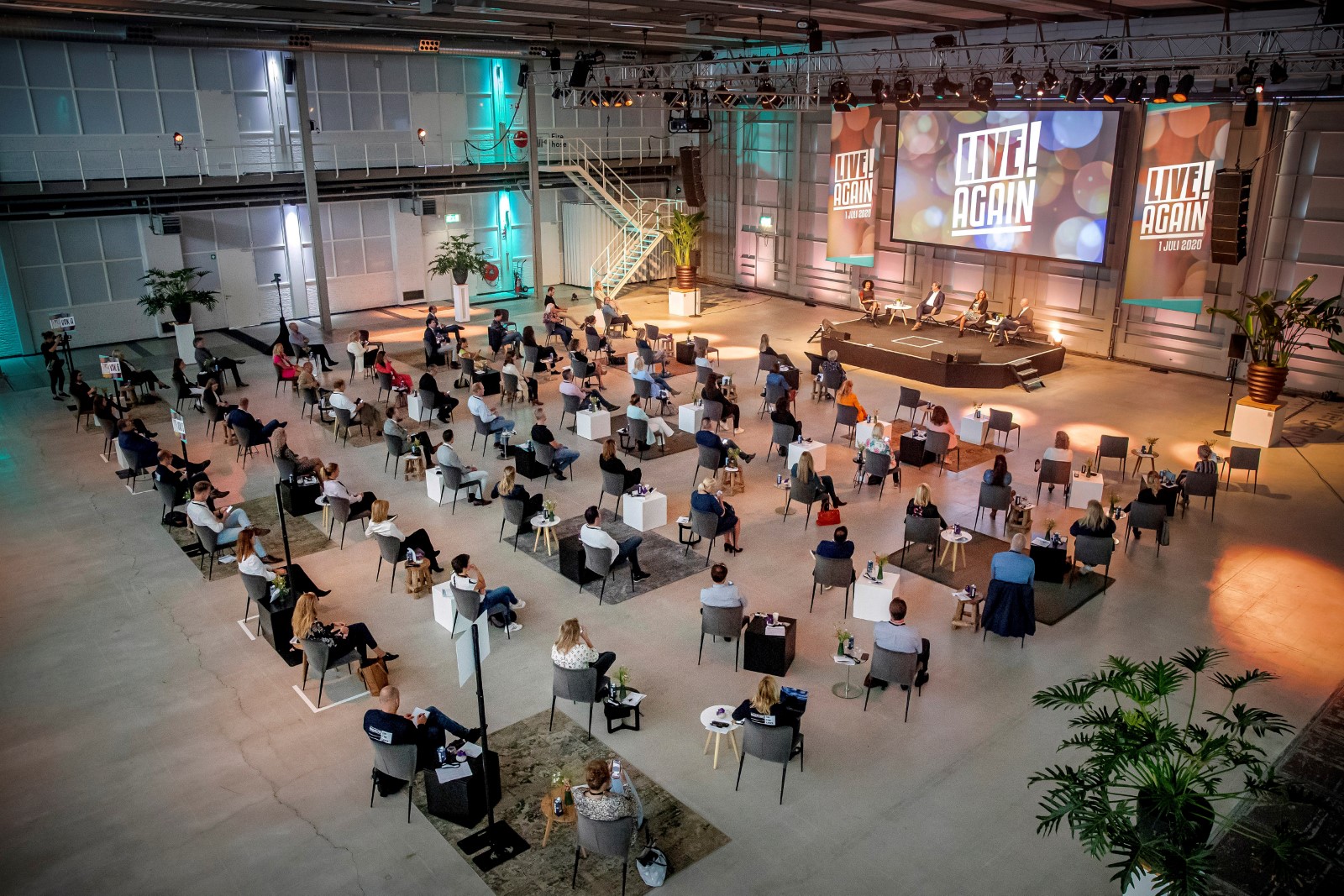Forced by corona, TU Delft professor Wim Uijttewaal organised his River Flow 2020 congress online this year. That gave him an idea. “We need to reinvent the conference.”
The first livecongres in the Netherlands took place on 1 July 2020. (Photo: Marketingtribune | Patrick van Katwijk)
“I am now convinced that we need to move away from the conventional way of attending congresses. Everyone flies in from all over the world. Can we afford to do that at a time when everyone is being asked to contribute to CO2 reduction?” This is what Professor of Hydraulic Engineering Wim Uijttewaal wondered after organising an online conference for 400 participants. For the time being, he intends to stop attending congresses and instead develop ‘hybrid’ congresses. What was that again?
Uijttewaal sees it this way: you have physical congresses for the people living nearby, but you make all the materials available digitally and record the sessions. People from outside can attend at a lower rate and without having to travel. And they can also respond to things. If the congress takes place on your continent next year, you can be there physically.
‘Given the circumstances, it was not too bad’
“Hybrid has been the buzzword since corona,” says Maarten Sauter, Manager of the TU Delft Event Solutions Department. “Before corona, academic conferences were physical events in one location to which everyone from all over the world flew to attend live. Since corona, these are cancelled, fully online or somewhere in between. The expectation is that they will eventually be somewhere in the middle, just like with working from home. People have experienced the possibilities and the benefits, as well as the shortcomings.”
Force majeure
In February, Uijttewaal worked with colleagues from Delft University of Technology, Deltares and Rijkswaterstaat on the preparations for the River Flow 2020 conference to be held in July. They read papers, invited speakers and developed the programme. The news occasionally talked about a new coronavirus, but it did not seem very worrying.
Until Prime Minister Rutte announced on 15 March the closure of all catering establishments, museums, concert halls and so on. Uijttewaal remembers it with a sigh. “We then had to rush to find a way to make the congress web-based. Other congresses opted for postponement, first to October and later to February. We chose to stick to the date and put the material online. That was all we could do. Force majeure. In hindsight, I am not dissatisfied. In fact, given the circumstances, it was not too bad.”
‘You don’t come home every year with 20 new friends’
The solution that Uijttewaal and colleagues chose was to make the contributions, lectures and PowerPoint presentations available online. There was no longer a timetable. That made access flexible, but also non-binding.
“An online conference can be advantageous in a number of ways,” says Sauter. “You can reach a much larger target group, certainly from low and middle income countries. You can reach people who don’t have the means to travel to a congress, but who can now participate. That also applies to PhD students. It is also good for the environment.”
Resistance
What did the participants think? “You can see that people are resisting online congresses,” Uijttewaal remarked. “They think it’ll be boring, another whole day at the computer, and they miss the outing. I understand that, because you are used to seeing each other in person. You miss the informal part where you meet people and make friends. But you shouldn’t exaggerate this. Of course you make friends, but you don’t come home every year with 20 new friends.”
‘How do you add networking?’
Looking back, Uijttewaal would have liked to have included more communal events with online interaction. One example was the live masterclasses via Zoom aimed at students and PhD students. These were a success.“Young people are more flexible with these kinds of tools anyway,” says Uijttewaal. “If you organise it well and give people the opportunity to talk and the time to interact, you see that they experience virtual masterclasses very positively and even use it to build their network. Some groups agreed to ‘see’ each other again six months later. That’s a lot of fun.”
Hybrid
The success of the online event gave rise to the idea of a hybrid conference: a live event with a small number of participants combined with full online remote access. The problem is, it has yet to be put into practice because hardly anyone has experience with it. Sauter discovered this when he started looking for examples of hybrid academic congresses.
“The challenge is how do you put together a programme that is interesting both for visitors who are physically present in the room and for people who participate online? How do you deal with time zones? How do you add networking, which is very important for congresses?”
A hybrid conference isn’t necessarily cheaper either, Sauter explains. The room hire remains the same but with fewer visitors sitting further apart. And you have to invest time and money in an online platform. Only the catering is cheaper.
- The Event Solutions Department will start with two hybrid conferences next year: Coastal Dynamics and the European Control Conference (ECC).
- Because other universities are facing the same questions, Sauter and his colleagues will collaborate with the Universities of Amsterdam, Wageningen, Leiden, and Tilburg to organise an online conference on online and hybrid event management in November entitled the Digital University Day.
- For TU Delft staff, the Event Solutions Department is available for information on hybrid conferences as well as an organisational office.
Do you have a question or comment about this article?
j.w.wassink@tudelft.nl


Comments are closed.